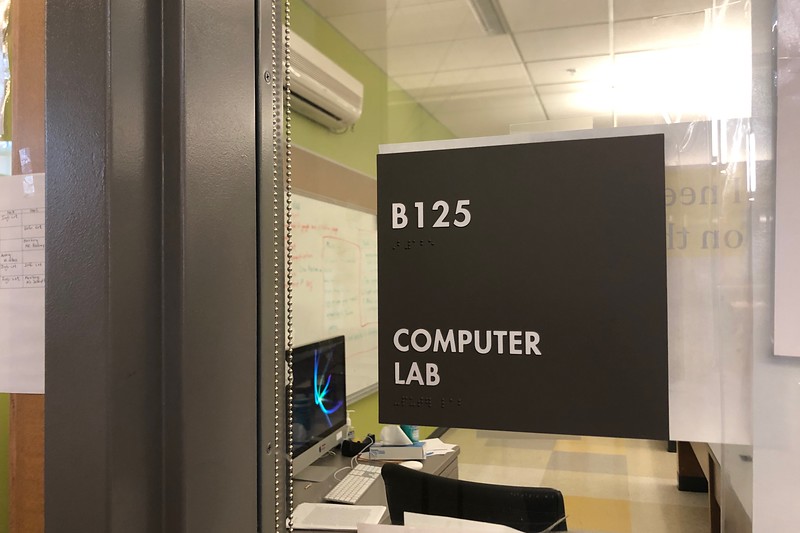To Google or not to Google?
Students and teachers reflect on the importance of effective research.
Credit: Alex Janoff
The computer lab where the Information Literacy class meets. Students are required to take info lit for the first semester of their freshman year. The course teaches students how to use databases and apply them to research projects. “The beauty of the database is that you can go straight to the databases,” history teacher Eva Urban said. “You can get good, reliable information that’s exactly what you need.”
December 4, 2018
When beginning a typical research project, a high schooler’s instinct is to quickly type their research question into Google and click on the first three links. Although this seems to be the most convenient option, there are many other methods that students can use to find adequate research. Information Literacy (Info Lit), a freshman single-semester course, teaches the skills required to complete basic research projects at the high school level.
“The three basic skills we’ve boiled it down to this year [are] finding and using databases, evaluating websites [and] citing your sources,” Info Lit teacher Joanne Schmidt said.
In Info Lit, freshmen learn how to evaluate the usefulness of a source based on its currency, relevance, authority, accuracy and purpose. According to Schmidt, some of the most important aspects of a source are its authority and accuracy.
“Are you looking at a mommy blogger, and taking their information about social media, or are you looking at a psychologist who studied social media and has written lots of articles about it?” Schmidt said.
Sophomore Sam Goldstone echoed Schmidt’s sentiment while noting that evaluating sources isn’t extremely difficult.
“Most websites that come up you can self-evaluate,” Goldstone said. “It’s mostly just common sense.”
Another keystone of the class is finding and using the various databases the school provides to the student body. Schmidt stresses the use of the databases when it comes to research projects.
“If you just use websites and not the databases, you might not be finding the best information about your topic,” Schmidt said.
Nevertheless, many students remain adamant in sticking to Google for their research. According to Goldstone, even after completing the Info Lit course, he plans on using Google for research.
“Having background knowledge about the topic helps, but I still use Google to get information [for research projects],” Goldstone said.
History teacher Eva Urban maintains that the vetting of databases by academics makes the databases much more useful to students conducting research projects than a simple Google search.
“When you jump into Google and Google something, you get 10,000 different sources you can take a look at,” Urban said. “Many of those sources are not going to be very useful. You’re really going to be spinning your wheels and wasting your time.”
Urban requires her students to use the databases in order to find the best information for their research.
“There’s a number of reasons why I insist on the databases,” Urban said. “The first is databases are extraordinarily time efficient, [and] the second reason is the databases are already vetted.”
Junior Artur Poole recognizes the importance of using databases for research projects. He notes, however, that teachers tend to directly provide database sources to the students, making that aspect of Info Lit somewhat unproductive.
“Usually our teacher has an area where we can locate [the databases],” Poole said, “It’s not helpful that we have the class to teach us about them.”
Urban acknowledges that teachers supplement Info Lit’s curriculum in their own classes. Regardless, she emphasizes the importance of having a class focused solely on research skills.
“Do I think my students can do it? Absolutely,” Urban said. “Do I think they need to be taught to do it? Well, I think yes. I think that Wayland High School is doing a great job trying to prepare [students] to vet [their] resources.”
Wayland High School’s collection of databases is available to all students and can be found on the Library Media Center website under “databases and selected sites.”





![Last Wednesday, the Wayland School Committee gathered to discuss a number of topics regarding the health curriculum and Innovation Career Pathway course. Another large topic of conversation was the ways to potentially mitigate distracting cell phone usage. "These [phones] are going to distract your learning and social relationships," Superintendent David Fleishman said. "That's concrete right there."](https://waylandstudentpress.com/wp-content/uploads/2025/06/Screenshot-2025-06-04-at-9.49.31 PM-1200x886.png)



























![Troy Hoyt finishes the Boston Marathon, running for the Hoyt Foundation. T. Hoyt is the son of Hoyt Foundation CEO Russ Hoyt.
“[Running a marathon] might seem like a big thing, when it’s presented to you at first, but if you break it up and just keep telling yourself, “Yes, you can,” you can start chipping away at it. And before you know it, you’ll be running the whole 26 miles, and you won’t even think twice about it.” T. Hoyt said.](https://waylandstudentpress.com/wp-content/uploads/2025/04/C36E8761-1CBB-452E-9DF2-543EF7B1095E_1_105_c.jpeg)














































janoffs dad • Dec 8, 2018 at 8:33 AM
tf is this
Jackson Lieb • Dec 5, 2018 at 9:29 PM
Janoff is my muse
Sam Goldstone • Dec 4, 2018 at 9:25 PM
I surrender to the superior Eva Urban